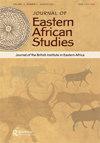埃塞俄比亚的发展国家和在哈瓦萨工业园区为年轻移民妇女劳动力的再生产而斗争
IF 0.6
3区 社会学
Q2 AREA STUDIES
引用次数: 6
摘要
摘要数以万计的埃塞俄比亚年轻妇女从小镇和农村地区迁移到哈瓦萨工业园区工作,那里的工作条件和工资远低于她们的预期。低工资和高生活成本意味着工人在满足他们对食物和住所的基本需求方面面临着严峻的挑战,而食物和住所是再生产自己劳动力所必需的。对HIP中移民妇女劳动力再生产斗争的关注,使人们对埃塞俄比亚发展国家的做法产生了深刻的认识。发展型国家积极制造和再生产廉价劳动力,以吸引国际资本并支持经济增长。国家保护国际纺织制造商,使其免受复制制造商赖以盈利的劳动力的负担。HIP的案例是对最近关于非洲城市的研究的必要补充,该研究主要关注非正规经济。工厂工作的不稳定性质导致一些年轻女性通过小规模、通常是非正式的创业工作来寻求稳定,这一过程颠覆了传统的经济发展叙事。工资劳动和自营职业之间的复杂关系表明,有可能制定有利于穷人的政策,而不仅仅是为国际制造商复制劳动力。本文章由计算机程序翻译,如有差异,请以英文原文为准。
The Ethiopian developmental state and struggles over the reproduction of young migrant women’s labor at the Hawassa Industrial Park
ABSTRACT Tens of thousands of young Ethiopian women have migrated from small towns and rural areas to work in the Hawassa Industrial Park (HIP), where working conditions and wages are far below their expectations. Low wages and a high cost of living mean that workers face severe challenges in meeting their basic needs for food and shelter that are necessary for reproducing their own labor. Attention to struggles over the reproduction of migrant women’s labor at the HIP generates insights into the practices of the Ethiopian developmental state. The developmental state actively makes and reproduces cheap labor to attract international capital and support economic growth. The state protects international textile manufacturers from the burden of reproducing the labor that manufacturers rely on for profits. The case of the HIP is a necessary complement to recent scholarship on urban Africa that has focused overwhelmingly on the informal economy. The precarious nature of factory work leads some young women to search out stability with small scale, often informal, entrepreneurial work, a process that disrupts conventional narratives of economic development. The complex relationship between wage labor and self-employment suggests possibilities for pro-poor policies that go beyond reproducing labor for international manufacturers.
求助全文
通过发布文献求助,成功后即可免费获取论文全文。
去求助
来源期刊

Journal of Eastern African Studies
AREA STUDIES-
CiteScore
3.30
自引率
7.10%
发文量
12
期刊介绍:
Journal of Eastern African Studies is an international publication of the British Institute in Eastern Africa, published four times each year. It aims to promote fresh scholarly enquiry on the region from within the humanities and the social sciences, and to encourage work that communicates across disciplinary boundaries. It seeks to foster inter-disciplinary analysis, strong comparative perspectives, and research employing the most significant theoretical or methodological approaches for the region.
 求助内容:
求助内容: 应助结果提醒方式:
应助结果提醒方式:


